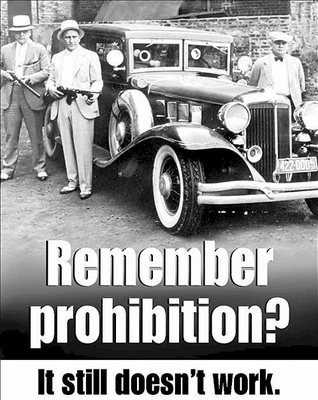Cannabis is supposed to be a “gateway” drug? The drug that leads people on to harder drugs?
Bullshit.
What makes harder drugs so prevalent is Prohibition. If you don’t believe me, then just ask thousands of current and former members of law enforcement who support drug regulation rather than prohibition—including Scotland Yard’s former head of drug policing.
- Prohibition doesn't get drugs off the street. The government can't even get rid of drugs in the controlled environment of a prison, so they certainly can't get rid of them from the relative freedom of our streets. Which means….
- Outlawing drugs doesn't make them go away; it simply puts them in the hands of outlaws, and in the hands of the soft targets on whom the outlaws focus. Which means…
- Prohibition limits demand a little, but it limits supply a lot -- as every economics student knows, this pushes up prices a lot, and gives remaining dealers a profit on a plate.
- Prohibition means people don't stop consuming drugs they just change the drugs they're consuming.
Which means there is what Milton Friedman called an “Iron Law of Prohibition” (yes, ACT members, that Milton Friedman) which says that the more you actively prohibit drugs, then it is the more virulent drugs you actively encourage. Which means instead of the relatively benign drugs like cannabis, alcohol and tobacco being easily available and sold by friendly pharmacists, it’s the nasty stuff instead—and peddled by fearless gang members. Johann Hari summarises:
‘You are not mistaken in believing that drugs are a scourge that is devastating our society [said Friedman]. Your mistake is failing to recognize that the very measures you favour are a major source of the evils you deplore.’
Friedman proved, for example, that prohibition changes the way people use drugs, making many people use stronger, more dangerous variants than they would in a legal market.
During alcohol prohibition, moonshine eclipsed beer; during drug prohibition, crack is eclipsing coke. He called his rule explaining this curious historical fact “the Iron Law of Prohibition”: the harder the police crack down on a substance, the more concentrated the substance will become.
Why? If you run a bootleg bar in Prohibition-era Chicago and you are going to make a gallon of alcoholic drink, you could make a gallon of beer, which one person can drink and constitutes one sale – or you can make a gallon of pucheen, which is so strong it takes thirty people to drink it and constitutes thirty sales. Prohibition encourages you produce and provide the stronger, more harmful drink.
If you are a drug dealer in Hackney, you can use the kilo of cocaine you own to sell to casual coke users who will snort it and come back a month later – or you can microwave it into crack, which is far more addictive, and you will have your customer coming back for more in a few hours. Prohibition encourages you to produce and provide the more harmful drug.
For Friedman, the solution was stark: take drugs back from criminals and hand them to doctors, pharmacists, and off-licenses. Legalize. Chronic drug use will be a problem whatever we do, but adding a vast layer of criminality, making the drugs more toxic, and squandering £20bn on enforcing prohibition that could be spent on prescription and rehab, only exacerbates the problem. ‘Drugs are a tragedy for addicts,’ he said. “But criminalizing their use converts that tragedy into a disaster for society, for users and non-users alike.’
It’s not complicated. If you don’t want gangs deciding what drugs your children are going to dabble with, because they will, then end the War on Drugs now.
If you do want a legal, transparent, accountable market for drugs, rather than an illegal, secretive, unaccountable one, then end the War on Drugs now.
If you want police cracking down on real criminals instead of spending time frisking people harming only themselves, then end the War on Drugs now.
Because if you can’t even keep drugs out of prisons, then you sure as hell can’t keep them off the streets.
How could you end Prohibition easily? Well, here’s a simple proposal: just start by unbanning all the drugs less harmful than alcohol. (According to Britain’s widely respected Lancet journal of medicine, that means we could immediately legalise for recreational use (in decreasing order of harm): Buprenoprhine, Cannabis, Solvents, LSD, Methylphenidate, Anabolic steroids, GHB, Ecstacy, Alkyl Nitrites, Khat, and di-hydrogen monoxide.) On what rational basis could anybody object? Especially if they’re an alcohol “user” themselves?
NB, for those not familiar with Uncle Milt’s Iron Law of Prohibition, here’s a handy summary:



2 comments:
John Banks is a lefty cocksucker.
Friedman knows all!
Post a Comment